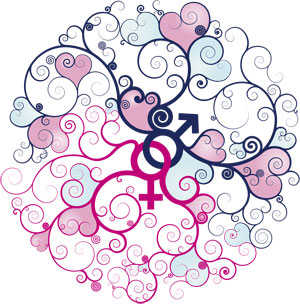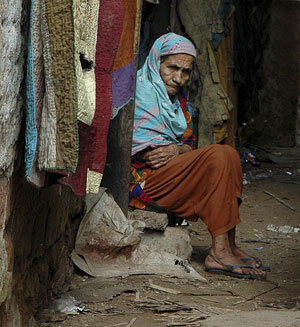Sex and the Pakistani Woman
By Shimaila Matri Dawood | News & Politics | Published 14 years ago
Scene One:
A group of well-heeled, sophisticated young adults are at a party, thrown by the host to celebrate her upcoming winter wedding. Strains of Nelly Furtado’s hit song ‘Promiscuous’ reverberate from the DJ’s sound system into the night. The women, frosted up in diamonds and dressed to impress, groove to the beat, sip margaritas at the well-stocked bar, and discuss a range of superficial topics (or perhaps a range of topics superficially) … a socialite’s unflattering makeover, whether the Dubai default will cause prêt prices to fall, and if President Zardari can hold on to power for long.
In a quieter corner sits an all-female quarter, aged between 25 and 40. One of them talks about a recent sex survey undertaken by an Indian magazine. “It’s called ‘The Fantasy Report’” she says, “and it’s about sexual fantasies. They do one every year, in collaboration with a local NGO. Last year’s survey talked about under-age sex, sex with prostitutes and eunuchs, kinky sex, adultery, incest, homosexuality, preferences, favourite positions, attitudes towards role-playing and other sexual activities. I wonder what the findings would be if they could do one in Pakistan ?”
A friend interjects, “The mullahs would spontaneously combust! Have you forgotten what happened to that poor girl who was flogged in public in Swat. Can you imagine what would happen to anyone who talked about sex in a public domain!”
“But we have,” says another, “when the hit theatre play, The Vagina Monologues, was staged in Pakistan a few years ago.”
“That trashy show?” says a fourth lady, “I didn’t see it. My husband said he’d break my legs if I was seen there! But I did read somewhere that a woman was charged with sexually immoral behaviour at least three times a day in Pakistan. Isn’t that funny?”
Their fifth companion, who had earlier been eagerly gossiping about a mutual friend’s rocky marriage, fidgets uncomfortably. Despite the fact that she is her husband’s second wife, and that she has four children — only two of which she had actually wanted — she cannot, in good conscience, bear to listen to this “immoral” conversation. Her ustani at the Quran class she had recently attended warned her to not talk publicly about shameful things…
Scene Two:
A 12-year-old girl, Asifa, sits with her mother, her sister and her sister-in-law — all of whom are eagerly tuned in to Star Plus’ latest hit soap. The beautiful heroine on TV is plotting how to woo her husband back from the evil seductions of her stepsister, who is pregnant with her boyfriend’s love child, and is cleverly pinning the paternity on her husband. Asifa’s stomach starts to hurt, she suddenly gets severe cramps and is forced to retire to her bedroom. She thinks she is about to faint in pain, it is so intense. Her clothes are stained with red, she thinks she is about to die, what on earth is happening to her? She is about to call her mother, but thinks better of it. Perhaps her friend Anum can help; she picks up the phone and starts to dial …
Scene Three:
The setting is a low-income katchi abadi in Karachi. Six-year-old Sara wakes up in the middle of the night. Her mother is not lying on the floor next to her, as she usually does. She is on her father’s bed, being beaten up, or so she thinks. Ten-year-old Hafsa is also watching, one eye closed. Why, she wonders, is her mother being hurt, and why does she voluntarily go to the charpoy? When both Hafsa and Sara wake in the morning, their mother is sleeping right next to them on the floor. Neither of them dare ask her if she is alright; she seems perfectly normal, as she always does.
Three very different groups and lifestyles coexist in urban Pakistan. The first scene is a shot of society’s liberal elite, the second describes a common evening in a middle-class household and the third is set within Azam Basti. All three groups speak different languages, the first English, the second Urdu and the third Katchi. All three live completely different lives — they attend different schools, dress differently, practice distinctively different moral policies and philosophies. All three, however, have one thing in common — the same outlook when it comes to what, in Pakistan, is still the one taboo topic of discussion: sex and women.
“Pakistani women should remember that they are Muslim, and Muslim women do not talk about intimate affairs, unless it’s in the privacy of their own homes. It’s shameful to talk about this topic openly,” remarked the lady at the party in scene one, but similar sentiments could have been expressed by any of the women from the other two backgrounds.
What makes sex in Pakistan such a taboo subject?
Is it the nation’s maulanas, the custodians of our morality, who continue to harp on the necessity of guarding women’s sexuality?
Ironically, a Google report published in 2006 ranked Pakistan number one globally as the place from which the maximum searches for the word ‘sex’ originated. Another report stated that a woman is raped almost every half an hour somewhere in Pakistan. According to interior ministry documents placed recently before the National Assembly, a staggering 7,546 women were raped in a mere 24-month span between 2007-2009, coming to a shocking rate of 314 rapes every month. The Punjab topped the list, with a total of 5,903 women reportedly raped. And these are just the official statistics. Newspapers abound with stories of ‘honour’ killings based loosely on rumoured sexual infidelity or promiscuity.
 But hardly any forum exists in Pakistan to discuss the status of women and their sexual issues, their sexual rights, their sexual health or just simply their sexuality.
But hardly any forum exists in Pakistan to discuss the status of women and their sexual issues, their sexual rights, their sexual health or just simply their sexuality.
All this while, neither religious edicts nor preachers condone or encourage silence over any discussion on sexual rights.
Several ulema say, “The Quran and the hadith both suggest that there is a need to educate both boys and girls about their sexuality and their sexual rights.” Had this not been the case, there would be no exegesis on matters of sexual conduct in the Quran, as in Surah Yusuf, the clarification that husband and wife are garments for each other, an explanation of permissible sexual habits, or even the hadiths that talk about Hazrat Muhammad (PBUH) asking for bibi Ayesha to bring him the Quran while she was menstruating.
The confusion regarding the topic of sex and the Pakistani woman is evident in their conflicting realities.
More specifically, who is the real Pakistani woman? Is she just a pawn, to be used and abused at patriarchal will? Or does she, in modern day urban Pakistan, enjoy a modicum of liberation and empowerment?
Does she have a sexual identity? Can she exercise her sexual rights? Is she even aware of them?
From teacher-preacher, fundamentalist icons such as Umme Hassan or Farhat Hashmi and her unswerving disciples, who inspired a generation of women to cover head-to-toe in billows of black, to sassy supermodels, such as Iraj and Gia, clad at select fashion shows in just thongs and a bikini, two images depicting the Pakistani woman, equally as compelling, have been vying for supremacy in urban Pakistan for a few years.
Both depict completely different sides of how a woman perceives herself sexually.
Take for instance, the daughter of privilege. Essentially nocturnal by habit, she’s seen at all the haunts at which ‘liberal’ Pakistanis congregate — intimate dinner parties, charity extravaganzas, raunchy theatre productions such as Chicago, The V-Monologues, Mamma Mia, or even the OGS shows, raves and midnight dances at the beach. Her daytime pursuits include a few select fashion shows, or exercising her toned and exposed limbs at a zealously private club. She works in a bank or a multinational, drinks, smokes, has boyfriends. At weddings, she wraps herself in her latest Indian Satya Paul sari, a garment which was banned in government offices in the Zia era. For more casual dos she dares to bare in always western-wear.
This class of Pakistani woman is out there, and in your face. She is the role model of the young and trendy. Today’s divas are the designer-decked sethanis who think nothing of being photographed in miniskirts and dresses for society magazines such as Sunday or GT (Shalwar kameez is clearly only for dadi jee). And she’s consumed not just by the elite — her face sells billboards, newspapers, even television shows. She acts in plays commissioned by Pakistani channels with plots of sexual intrigue and adultery. As a model, she struts on foreign and local runways. As a beauty queen, she is the princess of a Canadian pageant. Fashionistas on talk shows wax lyrical on how they have a right to wear what they want, and that it is for those who harrass them to grow up and accept the change.
But is this minor bubble of Pakistani society, which at best comprises 2% of the population, really comfortable with her sexuality? Will she talk about sex openly? Is she even informed on issues that affect her sexual biology?
 The findings of a recent study show that a majority of respondents in the upper crust of society were unaware of the dangers of unprotected sex, which can cause HIV or Hepatitis C. Almost none had received any counselling from their mothers, schools or family on basic biological changes such as puberty, and most felt embarrassed to discuss sex or their bodies openly with a health worker, their husbands or their families. Less than 5% said they could talk freely with their husband about their intimacy. And according to a leading psychiatrist at the Aga Khan University, a high percentage of women in the elite class are beaten and exploited both sexually and physically.
The findings of a recent study show that a majority of respondents in the upper crust of society were unaware of the dangers of unprotected sex, which can cause HIV or Hepatitis C. Almost none had received any counselling from their mothers, schools or family on basic biological changes such as puberty, and most felt embarrassed to discuss sex or their bodies openly with a health worker, their husbands or their families. Less than 5% said they could talk freely with their husband about their intimacy. And according to a leading psychiatrist at the Aga Khan University, a high percentage of women in the elite class are beaten and exploited both sexually and physically.
According to Sheena Hadi, life skills education manager at a Karachi-based NGO, Aahung, working to improve the sexual rights of men, women and adolescents since 1995, “The surprising thing is that even young girls from low-income family backgrounds are more in the know regarding their sexuality. They have the basic level of education about sex or even basic biological health, such as the changes that occur during puberty, than those in the privileged socio-economic communities. Due to the social stigma surrounding sex and sexuality in Pakistan, there is very limited access to correct information on normal physiology, sexual and reproductive processes, and healthy and safe practices among the educated Pakistani women.”
Ask the educated Pakistani woman about what the term sexual rights means and most would link it to sexual needs, preferences or habits.
All these terms, however, have different meanings.
While sexual rights pertain to the right of the woman to make her own decisions about her body (including her reproductive capacity, health and right to privacy and information), sexual habits is the term given to the specific types of sexual behaviour, needs are based on libido and preferences on individual tastes.
All these play a critical role in the empowerment of women.
Main story continues below
Sexual Rights
Sexuality is part of being human and, hence, the notion of sexual rights is part of the larger body of human rights. Human rights affirm the dignity, worth, respect, equality and autonomy of all people in all aspects of their lives. Sexual rights do not only mean the right to have sex. They are based on certain ethical principles that ensure a healthy and happy life for individuals and couples.
Sexual rights include:
- The right to sexual pleasure without fear of infection, disease, unwanted pregnancy, or harm.
- The right to sexual expression and to make sexual decisions that are consistent with one’s personal, ethical and social values.
- The right to sexual and reproductive health care, information, education and services.
- The right to bodily integrity and the right to choose if, when, how and with whom to be sexually active and engage in sexual relations with full consent.
- The right to enter relationships, including marriage, with full and free consent and without coercion.
- The right to privacy and confidentiality in seeking sexual and reproductive health care services.
- The right to express one’s sexuality without discrimination, and independent of reproduction.
Courtesy: Aahung
The lack of informed knowledge about sex, given the taboo nature of the topic, and the misinformation that men, women and adolescents receive, perpetuates myths and misconceptions about sex and serves to reinforce messages of shame, fear and guilt. This can lead to issues such as sexually-transmitted infections, sexual dysfunction, gender-based abuse and violence, including sexual violence.
Says Hadi: “Puberty is an introductory point, the prime time for imparting information regarding basic hygiene, physical changes, our bodies, etc. But because parents are so uncomfortable discussing the subject of our bodies, I’ve noticed that less than say 30% of girls know what menstruation is — although it’s a biological phenomenon, not sexual.” Elder women, aunts and cousins, share minimal sexual information, guarding them like ISI secrets. In an era driven by unlimited media of disseminating information, a vast majority of young Pakistani women resort to gossip to answer their queries about their own sexual health. “Commonly, mothers squeeze the women’s problem between deciding what to cook for lunch and the hit soap opera,” she says.
 If even the so-called educated woman is so in the dark regarding her sexuality, what about Pakistan’s other 98%, women who are often shrouded, and live in low income and relatively uneducated communities?
If even the so-called educated woman is so in the dark regarding her sexuality, what about Pakistan’s other 98%, women who are often shrouded, and live in low income and relatively uneducated communities?
It would stand to reason that they are even worse off.
Not so, notes Hadi. Interestingly, she says women from very low income communities have a higher level of sex awareness. Not everyone in these households has the space for a separate bedroom. It was this lack of privacy for sexual activity that caused a higher awareness level of sex among teenage girls in these communities. However, this access to first-hand encounters with sexuality caused more problems than solutions and has often resulted in a blatant violation of women’s sexual and human rights.
Women here were concerned about privacy and embarrassment when their own daughters were becoming sexually mature. Demands for what they termed excessive sex, caused them to dislike and abstain from relations altogether. For some middle-aged women, refusing sex led to desertion. Says one such woman, who works part-time as a maid, and who has had eight children, “My husband became more and more sexually demanding. When my daughters reached puberty, I started feeling embarrassed by my husband’s daily demand for sex, especially when it was in the middle of the day and the children were all at home. My refusals led to physical violence and forced sex. When I tried to be more assertive and started saying no to sex on demand, my husband abandoned me for another woman. But I was unable to tell anyone the real reason why I was divorced.”
In communities where lack of privacy was not an overpowering issue, Aahung field workers find that information about sex and sexuality is almost never passed on from mother to daughter.
“We ask women in low-income communities such as Azam Basti, whether they knew about menstruation before they experienced it. The answer was always in the negative,” says Hadi. “We asked them what their feelings were when they started their period. Reponses varied between shock, ‘I thought I was going to die,’ and ‘I thought I had acquired a terrible disease.’ We asked them how they felt. The most common response was of fear. So then we asked them if they had educated their daughters about menstruation before time. All of them always said no. Why not, we asked them, did you want them to feel the same level of uncertainty and fear that you did when it happened to you? No, they replied, but it wasn’t appropriate to talk about these things before it happens. The fear was that women somehow would be led astray if they were informed in advance about sexual reproduction and health. The same problem reared its head when we asked women about child sex abuse and if it was a source of concern to them. Mothers in almost every locality we work with said they knew of at least one incident or one sexual predator. ‘Did you inform your children about him, or discuss the danger with your family?’ we asked. Once again, the answer was overwhelmingly negative.
“We got the same response, when we asked if they had informed their daughters about sex itself. Not one mother had talked about the issue with her daughter until she was married. It was considered barely tolerable to talk about sex and sexual health even after a girl’s marriage or her attaining puberty. And it was never discussed before.”
According to Sara Khan, a local advertising executive, because it is considered so shameful, women never discuss sex with their daughters. “When we use the words ‘chi chi’ and ‘shame shame’ for our private parts, what message does this send — that sex and sexuality are dirty, and that matters related to basic biological functions are embarrassing.”
Hadi reaffirms that this “shame” is internalised and associated with our private parts. Even doctors, who should know better, embarrass the women who seek their medical help.
“More often than not, doctors frame their questions to make a patient rethink their moral values. The first question they ask a woman coming in with a gynaecological problem is if she is married. However, marital status, for example, does not validate the existence of sexual activity or lack of it, in cases of abuse. Also, girls in this society prefer not to discuss their sexual history before their mothers-in-law who often accompany them, which means few of them seek out professional medical help.”
If even talking about sexual health is embarrassing, it’s a foregone conclusion that any meaningful public discussion on intercourse, rape, and sexual violence is totally out of the question.
According to a recent research paper, ‘Women’s Perceptions and Experiences of Sexual Violence in Marital Relationships and Its Effect on Reproductive Health’ that appeared in Health Care for Women International, in the latter part of 2008, coercion and nonconsensual sex are common in low-income communities and not limited to abusive relationships.
Researchers Rafat Hussain and Adeel Khan of the school of health at University of New England, Australia, conducted a study in two low- to middle-income areas of Karachi. They found that a Pakistani woman’s refusal to have sex could lead to varied responses — resentment, suspicion, anger, physical violence, and forced sex. For some women, the ongoing psychological trauma due to repeated physical violence made them want to avoid sexual contact altogether. The report spoke about the “hidden” nature of sexual violence, especially in relationships where there was no outward sign of physical or psychological violence. In such relationships, sexual coercion rather than forced sex was seen as a problem, and participants described sexual coercion by husbands through verbal taunts such as “Why did you get married?” or “You should have stayed in your parents’ house.”
Interestingly, the researchers found older women more accepting of being sexually violated, as illustrated by comments made by a 54-year-old woman in one of the focus groups: “This is part of marriage — many men behave like this, but young women these days think only of themselves.” Young women talked about excessive fatigue related to long hours of work involving child-rearing and doing household chores, which created a situation where sex on demand was seen as another task rather than as an intimate and pleasurable experience. Another strong theme was the link between nonconsensual sex and unwanted pregnancies. While sexual crimes against women, such as molestation, incest and rape are on the rise, there is little discussion on how to empower women with knowledge of their sexual rights, so that they can reclaim them.
It is the shame that surrounds the topic of sex that leads to women being branded loose and of unworthy character if they so much as seek sales jobs outside the home, or talk to a male companion.
According to health experts, religious leaders typically frown on discussions about sex, birth control and sexually transmitted diseases and have repeatedly harangued activists trying to spread the message. Most dismiss NGO workers, who want to educate women about their sexual rights, as “non-profits and westernised women working for so-called women rights.” These people are believed to be motivated by “getting funds from international donors and invitations for free foreign trips.”
There is also the staunch opposition put up by most Pakistani men, whether hailing from the lower, middle or the upper class, who instantly complain that attempts to educate women about sex tantamount to ‘their women’ being influenced by ‘promiscuous western ideas.’
Both Muslim clerics and conservative politicians always say they are protecting traditions and guarding against what they call the ‘free sex’ culture of unwed mothers and widespread divorce in the West. Recent opposition by hardliners to legal amendments that would provide better legal cover to domestically abused women, Pakistani ministers’ support of brutal tribal traditions that throw allegedly adulterous women in front of dogs and bury them alive, and the almost complete silence on the part of even women legislators on fundamental rights that affect half of Pakistan’s vote-bearing population testifies to the miles we need to walk as a nation to do what the Prophet (PBUH) emphasised so many centuries ago — protect the rights of its women.
As for the majority of Pakistani women, they say they are hardly looking for the Hollywood or Bollywood lifestyle. They just want to live a life that allows them to marry of their own consent, control their own bodies and reproductive rights, and be free of sexual abuse. After all, is that just too much to ask?
Voices from Within



 Most young women feel that they cannot openly discuss sexual health issues with their husbands, partly because sex and sexuality is a taboo subject and partly due to the fear that their motives may be misunderstood and they might even be accused of adultery:
Most young women feel that they cannot openly discuss sexual health issues with their husbands, partly because sex and sexuality is a taboo subject and partly due to the fear that their motives may be misunderstood and they might even be accused of adultery: